By: francesca scott
July 28 2023
The burning truth: Arson, misinformation, and the facts about climate change and wildfires in Greece
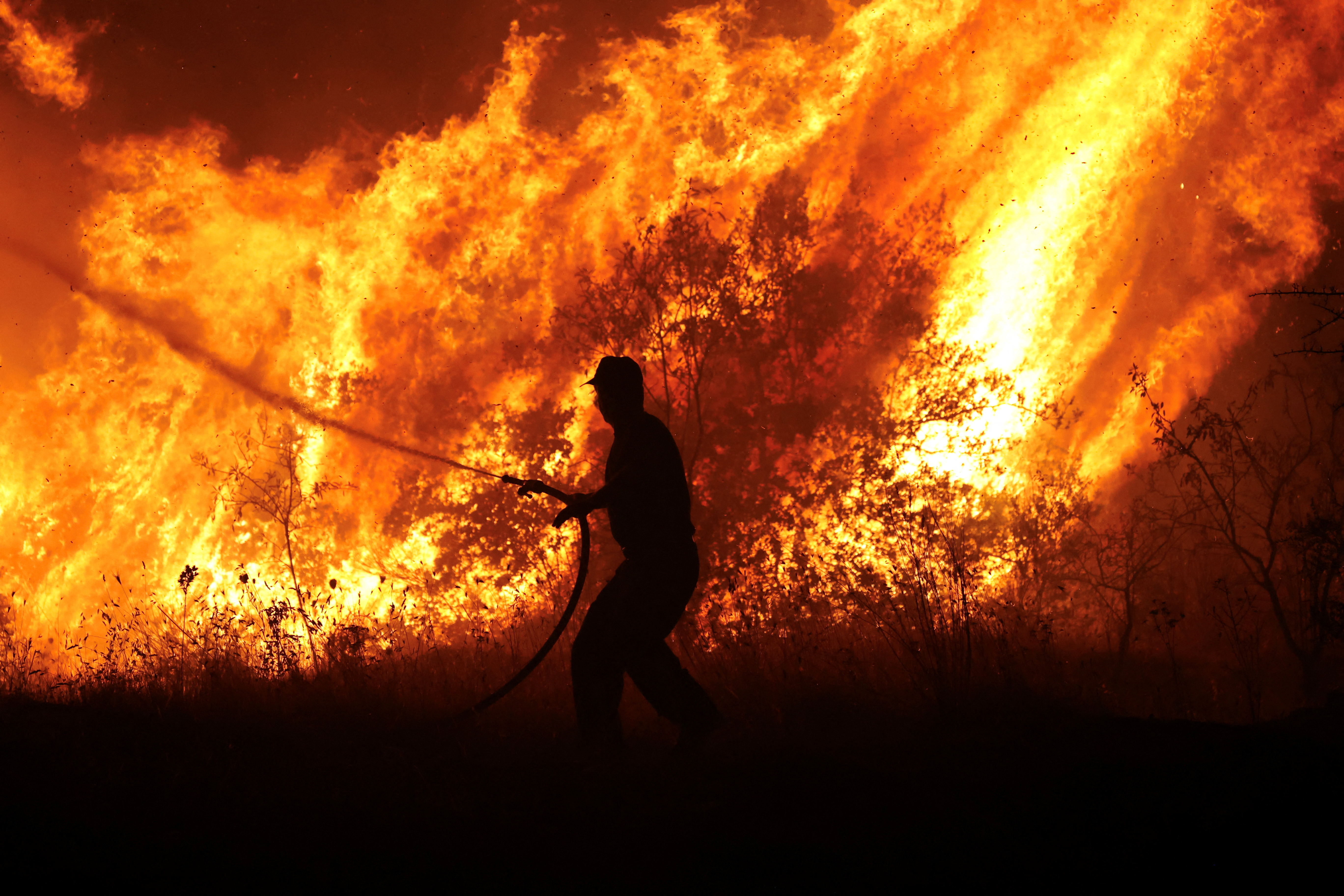
Source: Reuters
Another summer, another apocalyptic spate of wildfires across Greece. Citizens have lost homes and businesses, and the country has lost acres of land and uncountable wildlife. Airlines continued to fly in tourists until the 11th hour, when 30,000 holidaymakers were evacuated from Rhodes, aided by locals who know this story all too well. The world looks on as videos spread over social media; mountains burn, plumes of smoke darken the sky, and yellow, red, and purple heat maps fill our timelines.
Each year the same narrative returns – Climate change denial cloaked in diversion tactics. There’s no doubt that climate change is causing more intense wildfires, but skeptics continue to blame other factors – arson. The reality on the ground is very real, though; “The last years, we have seen an increase in both size, volume and the spread of wildfires in Greece. We have more fires, some of which are mega-fires, so more severe, complicated and difficult to manage, and we have fires earlier than the usual fire period,” says International Relations, European Security and New Threats expert and Security Policy Advisor to the Minister of State, Triantafyllos Karatrantos.
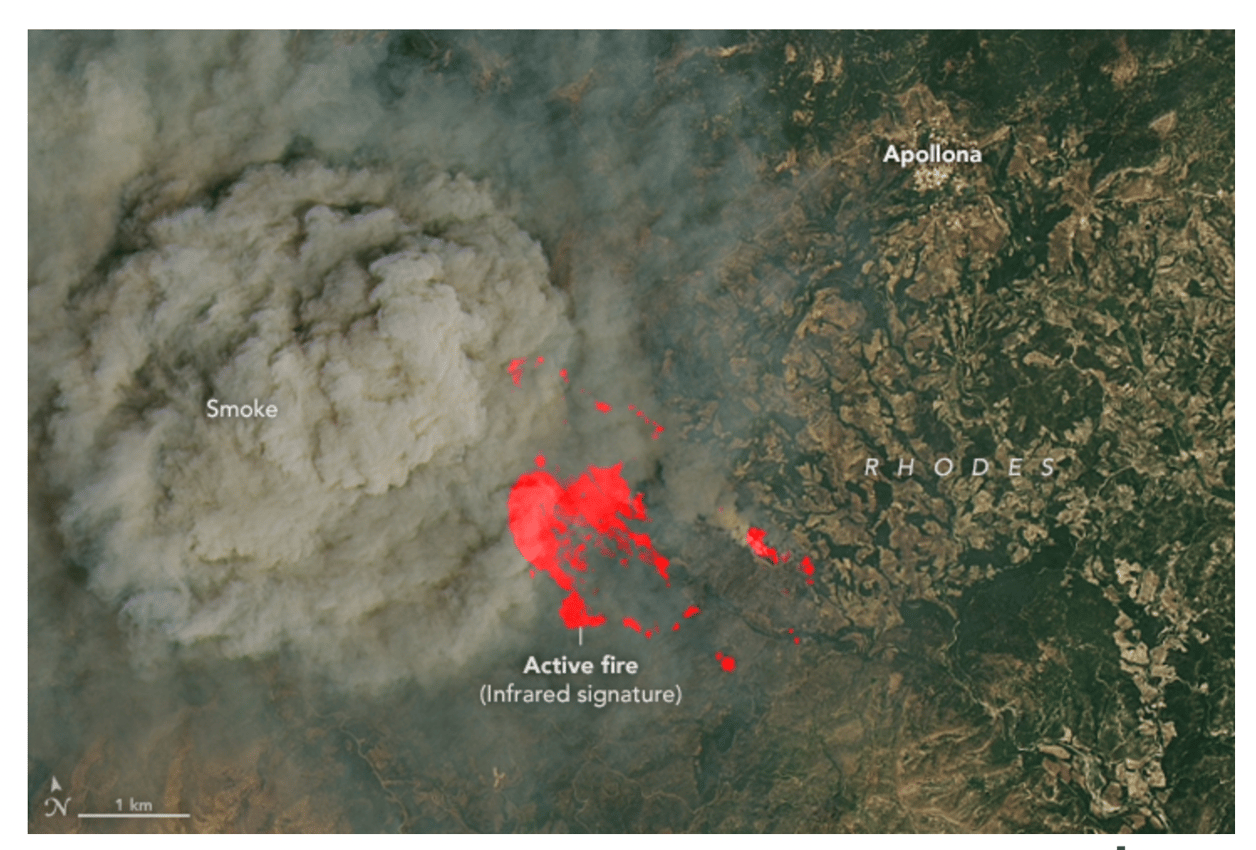
Satellite imagery of Rhodes wildfires, July 19, 2023. Source: Nasa
A twisted fire-starter
The term arson, commonly known as the intentional act of lighting fires, has two definitions in Greece; intentional and accidental. Accidental arson – essentially carelessness or ignorance – results from activities that may indirectly start a fire, such as agricultural machinery or power tools that cause sparks, outside grills or barbecues, discarded cigarette butts, or burning field waste. Intentional arson is the targetted setting of fires, as seen in Sicily this year. Media reporting often uses the term arson without specifying the circumstances, which sows further confusion. Often arson is “suspected” or “blamed” without any information on whether it was a malicious act or simply thoughtlessness.
As reported by Thetoc, the fire brigade’s 2023 arrest data in Greece for agroforestry fires up to July 13 reveal that “94 people have been arrested for arson by negligence and 5 by intention.” Wildfire analyst and researcher in the Department of Forestry and Natural Environment Management at the Agricultural University of Athens, Palaiologos Palaiologou, confirms this, as he tells Logically Facts that “almost 95 percent of the ~10,000 ignitions that happen in Greece each year are human-caused. Only a minority of ignitions have a natural cause, and these, most of the time, are easily suppressed and contained.”
He says the cause can’t be traced for almost half of these ignitions. Still, researchers are certain they are not caused naturally and “have to do with human activity, networks like electricity, road, and railroad, and agriculture – livestock raising practices.” He continues, ”A considerable number of these ignitions are due to arson, estimated between 15-30 percent of the known fire causes each year.”
Palaiologou points out that “the government response is to increase [security] patrolling or, under a state of panic, announcing stricter penalties or buying of new surveillance equipment, like drones. This was announced after the 2018 Mati fire that killed 100 people, and it was proved that the ignition was caused by a civilian that burned dead branches in his property.”
Human-caused fires are clearly a factor in wildfires. One spark, be it from lightning, an outside grill, cigarettes, or an angle grinder, is enough to start catastrophic fires.
Fuel for the oven
According to climate change deniers, wildfires are solely due to arson, often used as coded language, the implication that a secret, conspiratorial force is at play, a diversion tactic from the record-breaking heatwaves or modeling that has predicted an increase in wildfires since the 1970s. This narrative is presented in Western countries like the U.S. and the U.K. as proof of the “climate scam.”
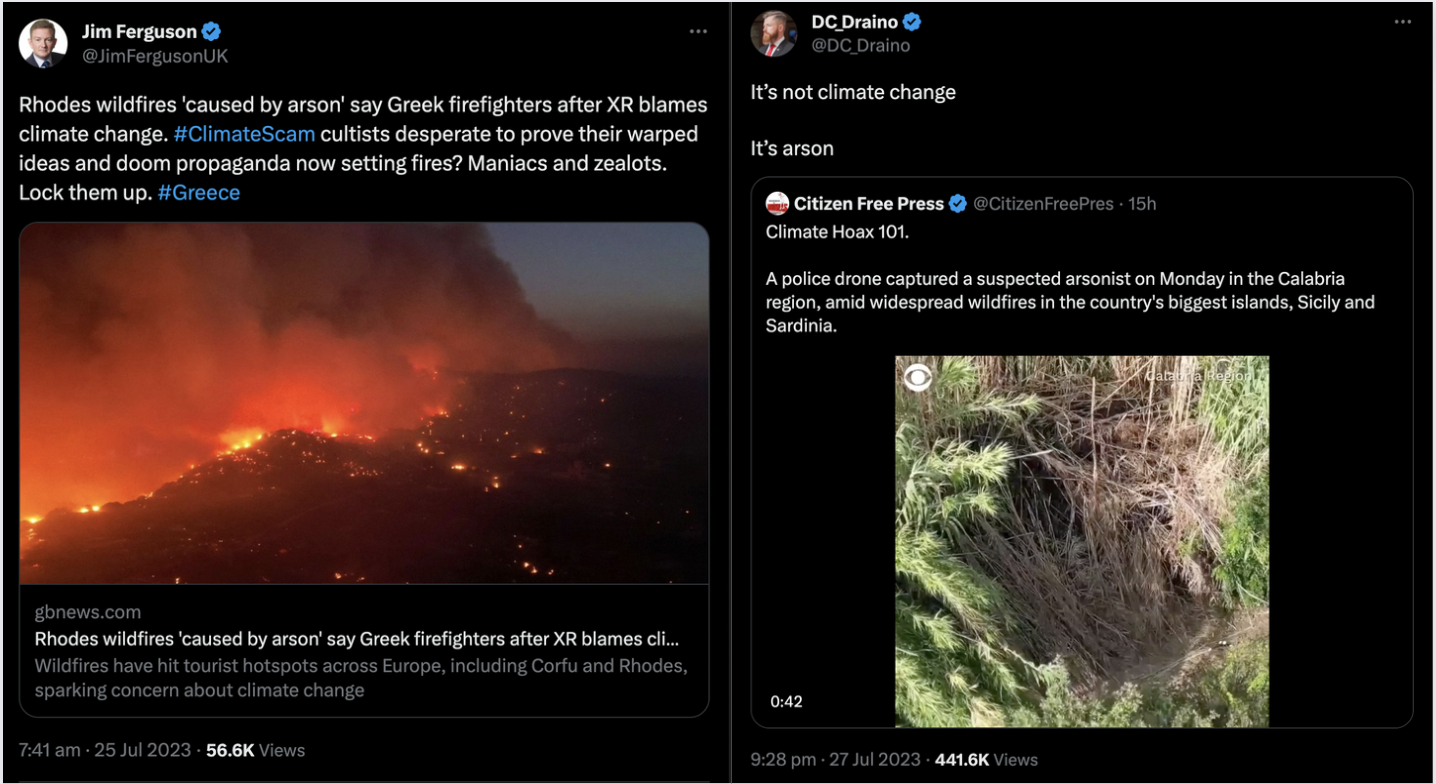
Left: Tweet from former Brexit party candidate Jim Ferguson, using the hashtag #ClimateScam and pointing to arson as the cause of wildfires. Right: Tweet from right-wing influencer DC_Draino, who led the Bud Light backlash, claiming wildfires are because of arson, not climate change.
Misinformation has fuelled speculation of arson around the globe. During Canadian wildfires that were so intense smoke obscured the New York skyline, people blamed arson. Kazakhstan also investigated arson as the cause of wildfires that burned through 766 hectares and killed at least one person in May 2023. Italy has seen around 800 wildfires, half of which have been attributed to arson. The commonality of these events must, however, be read with nuance.
Climate Action Against Disinformation’s (CAAD) Data Monitor report, Wildfire Misinformation: Arson Claims Set the Climate Debate Ablaze, analyzed misinformation related to arson during the 2020 wildfire season across the U.S., Australia, and Canada. It noted, “While isolated incidents of arson did occur in all episodes, they were falsely taken as evidence (or conclusive proof) for the 'true' issue at hand: i.e., human sabotage, not climate change.” Tweets from the then U.S. president's son, Donald Trump Jr., and far-right news site Breitbart, among others, amplified the arson narrative, providing inaccurate arrest figures that conflated arson with acts of carelessness, like cigarettes and barbeques.

Tweets by Donald Trump Jr. and Breitbart conflating arrests numbers. Source: CAAD
Palaiologou concurs: “The most important misinformation is about the level of wildfires occurring from arson, with the public believing that more than a half are due to some dark plan to burn the country or pursue unethical motivations and interests.”
As articulated in the journal Frontiers in Ecology and the Environment, “Misinformation often includes partial truths, which are central to its successful spread. An illusion of legitimacy omits critical contextual information, which is strengthened when the misinformation permeates high-profile popular press outlets.”
Herein lie the real consequences: “Misinformation’s wide reach can mislead policy makers, further eroding public support for broad-based fire policies,” the article states. The media plays a crucial role in public perception of climate change, as Palaiologou confirms: “The mass media rarely present or encourage denial views of climate change, and this must have played a role in the high levels of climate change acceptance in Greece.”
Wildfire tales
George Dikaios, an expert in international and European climate policy and diplomacy and researcher at the Hellenic Foundation for European and Foreign Policy, tells Logically Facts that climate skepticism is not prominent in the country. “One of the most comprehensive polls on climate change in Greece shows that 9 out of 10 people believe that climate change exists and that its main cause is anthropogenic activities,” he recalls.
Karatrantos further explains to Logically Facts that, of those who reject climate science, “we can distinguish between hardliners that are the minority. These are mainly people from the alt-right political scene who are very used to conspiracy theories and the rejection of any progressive agenda. The soft liners are not rejecting climate change as fact, but they are extremely hesitant about the severity and reasons behind it.”
Though climate change is an acceptable truth in Greece, wildfires have long been the target of conspiracy theories, and wildfires and renewable energy are a prominent misinformation narrative. But belief in climate change does not immunize against a vulnerability to conspiratorial thinking. Karatrantos explains, “Indeed, arson as a cause of wildfires is probably the most widespread misinformation about the wildfires in Greece. For an important part of the Greek public, a hidden conspiracy is behind arson that causes wildfires.”
While people believe climate change is real, many believe that “the instances of arson are cover operations from third countries, especially Turkey, that want to destabilize Greece. Others link arsons to clean energy investments, mainly wind energy infrastructure others are using old-fashioned theories about the future use of burned land.”
There are many examples where social media users “have uploaded images of wind farms and falsely claimed that they were built in areas where catastrophic fires occurred. The implication is that the area was subject to arson in order for the wind farm to be built, suggesting a malicious intent behind the construction,” Stelios Pournis, from the fact-checking organization Ellinika Hoaxes, tells me. “However, such claims are misleading.”
One post from 2022 from an animal rights organization concerned with wind farms’ impact on local environments and wildlife featured a digitally manipulated image. Pournis found evidence that the wind farms depicted had been built as early as 2003, with similar claims focused on the same site over the years. Spanish fact-checking site Maldita debunked a composite of images misattributed to Spain; one depicting a burn site and another showing a wind farm, allegedly taken years after, claiming to show "immediate construction in burned territory.” However, “The authorization for the wind farm was approved in May 2014, years before the fire, which occurred in August 2017. In addition, its location, although close to the fire, its location is not on the burned land.”
Feeling the heat
We’re not dealing with a global crime wave of arsonists here. It’s simplistic to focus solely on the moment of ignition and ignore the broader context of climate change.
Palaiologou is clear on the link between dryer conditions and wildfires. He tells me, “Extreme and persistent droughts, sometimes one following the other, are novel, and these conditions do not compare with the data we have from previous decades – heatwaves usually lasted a few days, and we had one or two per summer, per 3-5 years.” More frequently occurring extreme weather has been linked to climate change.
An increase in heatwaves during Greek summers brings growing problems, according to Palaiologu, who says that “now we experience 2-3 heatwaves every two years, each lasting at least one week. The clear linkage of persistent heatwaves with wildfire size and intensity is evident.”
The Copernicus Atmosphere Monitoring Service (CAMS), an EU-funded monitoring body, also points out the consequences of more heatwaves and wildfires, stating that its data “show the highest wildfire carbon emissions in July recorded for Greece, by a very large margin, with over 1 megatonne of carbon emitted until 25 July.”
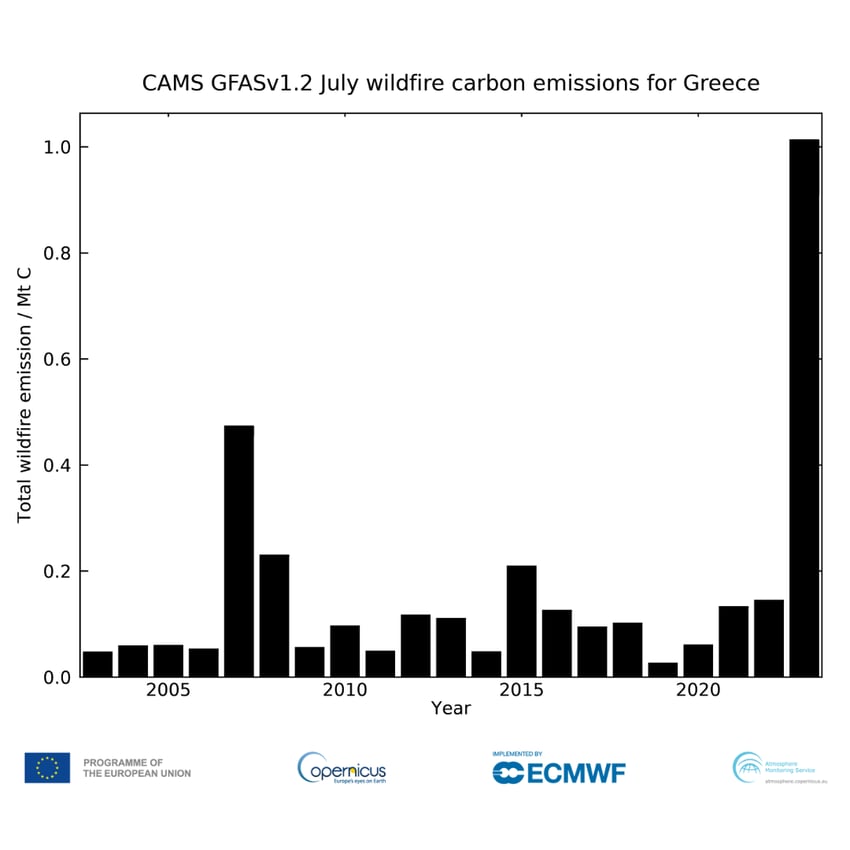
July wildfire carbon emissions for Greece. Source: Copernicus
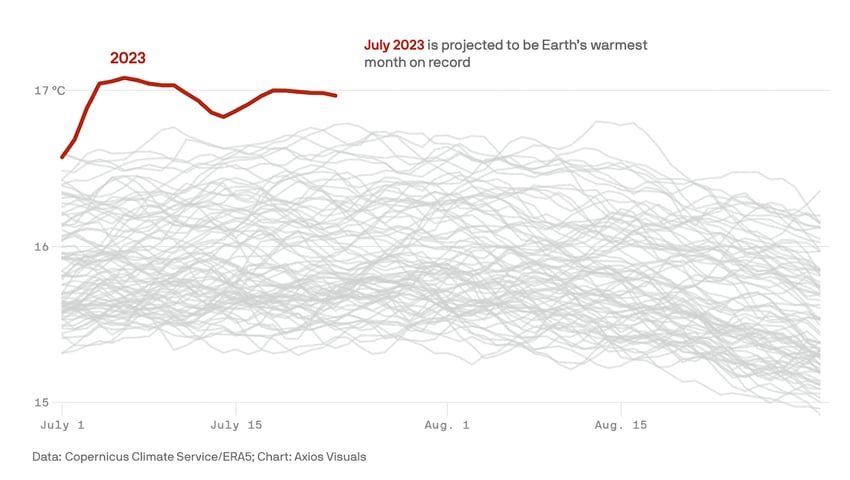
Daily global mean surface air temperatures, July through August 1940-2023; As of July 23, 2023. Source: Axios
Logically’s own climate change misinformation report from 2020 on Californian wildfires found “a discrepancy between the volume of news reports about online climate change misinformation relating to arson and the actual amount of misinformation we saw online about this subject.” At a time when misinformation is rampant, it is more critical than ever for media organizations to cover the whole picture of how global heating causes extreme weather. The public deserves accurate and honest reporting on scientific evidence. Cherry-picking and amplifying misinformation narratives that deflect blame from the true impact of climate change will have devastating consequences that will affect every single one of us.


